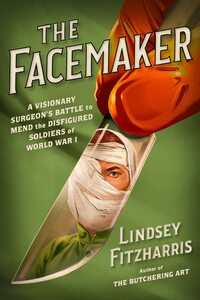Take a photo of a barcode or cover
738 reviews for:
The Facemaker: A Visionary Surgeon's Battle to Mend the Disfigured Soldiers of World War I
Lindsey Fitzharris
738 reviews for:
The Facemaker: A Visionary Surgeon's Battle to Mend the Disfigured Soldiers of World War I
Lindsey Fitzharris
informative
reflective
sad
slow-paced
If you're coming to this book from an interest in facial reconstruction and plastic surgery but know little about the war that drove such leaps in its development, don't worry. This book has you covered. There's easily as much about the war and its horrors as the science and its evolution. Just be prepared for how utterly appalling and depressing WWI was. All are but something about WWI and its modern ways to kill but antiquated ways to fight is rough. I liked that the narrator is a descendant of the subject, it was a very nice touch. Learning of Gillies work in his later years was also quite interesting.
Graphic: Death, Gun violence, Violence, Medical content, Medical trauma, Fire/Fire injury, War, Injury/Injury detail
Moderate: Animal cruelty, Animal death, Body shaming, Grief
challenging
informative
medium-paced
adventurous
dark
emotional
funny
hopeful
informative
inspiring
reflective
sad
medium-paced
(Finally getting around to writing a review for this because it deserves one.) Perhaps I'm biased because I'm so interested in WWI and I read this across several days at the beach, but this was amazing. So well-written and perfectly placed. The personal stories of the patients, Dr. Harold Gillies, and the medical breakthroughs occurring are woven together beautifully. You also don't need much medical knowledge to understand it, and the descriptions weren't too gruesome (I think I only said "ew" out loud once, which is impressive considering the subject matter). This was just a fabulous history of both medical science and European society at a time where destruction moved faster than healing. LOVED IT
challenging
emotional
hopeful
inspiring
sad
slow-paced
In France, they were called les gueules cassées (the broken faces), while in Germany they were commonly described as das Gesichts entstellten (twisted faces) or Menschen ohne Gesicht (men without faces). In Britain, they were known simply as the "Lonliest of Tommies" — the most tragic of all war victims — strangers to themselves.
The Facemaker was an accessible entry to the complex field of plastic surgery in war -- Fitzharris combines multiple primary sources to create an in-depth look of the work. Indeed, the opening pages detail Private Percy Clare [CW: Injury, Check Content Warnings]
Fitzharris follows Gillies from childhood until a fateful meeting with reconstructive dentists on the front line. Using his political connections, Gillies creates the first hospital dedicated to repairing facial injuries at Sidcup. There, behind a haze of cigarette smoke, multidisciplinary teams begin to write the book of plastic surgery. The war produced many horrific injuries, and medicine was forced to keep pace. Some of the photographs and sketches from Gillies' cases are included -- these are particularly powerful images, showing the both the innovation and the tender care applied to each patient. Indeed, some patients were that touched by Gillies', they worked for him after their treatment was complete.
The book also details other work taking place at the same time. Until this book I wasn't aware of the prevelance of tin masks, painstakingly constructed by different art studios, for those patients couldn't help. There is also discussion on the attitude of the public to these men at the time -- the quote above captures a snippet of this, but the inclusion of the blue benches (where the public knew to avert their eyes as it would be one of the Sidcup patients) was a particularly depressing read.
There is also attention given to Gillies post-war. as he enters the world of private practice. It is this era that truly builds plastic surgery into the juggernaut it is today. This includes revolutionising gender-affirming care, being involved with both Michael Dillon and Roberta Cowell. And surgery runs in the family, as Gillies' cousin Sir Archibald McIndoe further advanced the field in WW2.
Overall, strongly recommend this book an accessible and compelling look at a much misunderstood topic.
Graphic: Gore, Medical content, War, Injury/Injury detail
Moderate: Death, Vomit, Fire/Fire injury
Minor: Transphobia
emotional
informative
medium-paced
adventurous
hopeful
informative
medium-paced
adventurous
dark
emotional
informative
medium-paced
adventurous
challenging
dark
emotional
hopeful
informative
lighthearted
sad
medium-paced
Horrifying, heartbreaking, and endlessly fascinating. It's a very hard read content-wise, but absolutely stunning. I'm not one for military history in general, so feel like my knowledge of WWI battles was relatively low before reading this. But my love and appreciation of Fitzharris' work on 'The Butchering Art' and my interest in surgical history kept me absolutely on the edge of my seat for the release of 'The Facemaker'. It was completely worth the wait.





